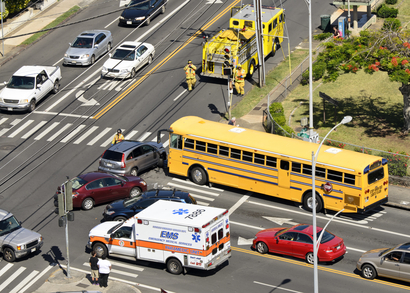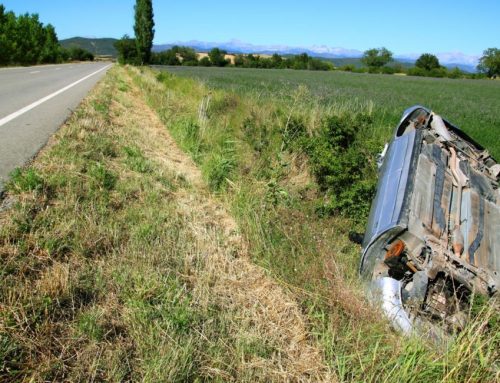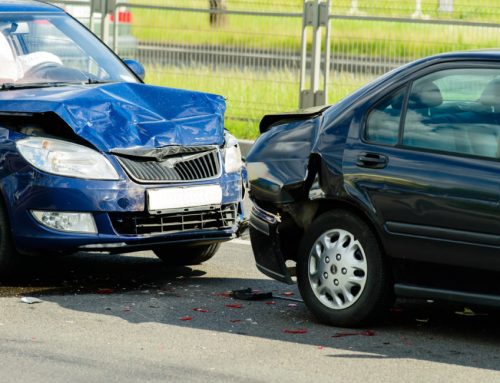John Maher: Hi, I’m John Maher. Today, I am speaking with Russell Guest and Richard Allen of Guest and Brady, in Greenville, South Carolina. Guest and Brady is a personal injury law firm. Today, we are going to be talking about auto accidents and protecting your family.
Russell and Richard, welcome.
Russell Guest: Happy to be here, John. Thank you for having me. This is Russell here.
Richard Allen: Hey, good morning, John. Glad to be here. This is Richard Allen.
John: Russell and Richard, if I’m in an auto accident and I have insurance, will my car be repaired? That’s probably the first thing that people are thinking about when they are in an accident. What am I going to do? I have to get my car fixed?
Richard: That is an interesting thing. Somebody’s been in a horrific accident sometimes, and I’ll have them come. They’ll be talking to me about their experience. They may be extremely injured but they just bought a brand new car.
It’s terrible, because now it’s all smashed up and their going, “Oh, my. Now I’ve got to get this thing repaired. Is it ever going to be the same? Is it going to drive the same? What is this going to mean to my car?” These are important questions. It’s interesting, despite the broken leg they might have, they’re thinking about their car.
There are different types of coverage’s, clearly, that will aide in the repair of the car. There are certain expenses that should immediately start to incur whenever you’re in an accident, regards to property damage. Those include the towing bill. Then, the tow truck company often tows that truck to their own particular yard or building.
There’s a storage fee, in South Carolina. I’m not aware of a single place that doesn’t start to charge storage fees instantly. Every day is $25 or $30 a day that it sits there. People just are not aware of that. It’s some months later and their storage bills are enormous. You’re going, “Wait a minute, isn’t that the responsibility of the other person, who was at fault, to pay for those bills?”
Not necessarily. The law in South Carolina also places an obligation on you to mitigate your damages. Mitigating your damages means to lessen them as much as you can.
You should have the ability ‑‑ it is the impression of the legislature here in the state ‑‑ to go and check and see what your obligation is in regards to storage fees and to have that vehicle either towed to another facility or be working that issue out with the insurance company earlier on.
Of course, people are dealing with their injuries or dealing with the trauma of the actual accident. They’re not thinking in terms of this unknown fee that’s stacking up.
Insurance companies will often call you after an accident if you’re not the at‑fault person, if you have not caused the accident, and they’ll be asking you to allow them to take your car, for you to release it from the tow company, so that they can transport it to a facility that doesn’t charge storage fees. That is something that is often done, and is appropriate to do so as well.
They will also work to begin to evaluate the car and understand what the damages are and whether it’s repairable or whether it’s not. In South Carolina, the rule is that if the repairs are 75 percent or more of the value of the car, then the insurance company can make this decision to total a car. What the value of the car is, is a question, and then what the actual value of the repairs is a question.
If you really want to keep your car, then you have to start to understand values and understand repair costs, and sometimes you have to challenge what their estimates are. But once you do agree that the repairs are 75 percent of the value and you agree that it should be totaled, your car then becomes a salvaged car.
They’ll pay you for the value of the car. They’ll pay you for taxes and tags that are also a part of the total value of that car, or you might be able to keep the car, but in that instance your car has some scrap value. It has a salvage value, and they will want to reduce the value that they pay you for that car based on their salvage value.
You can make some arguments sometimes with them about that to waive those costs, but you’ll want to, again, consult with somebody who’s experienced in these types of claims before making decisions about whether you should accept that. If the value of the repairs is not 75 percent of the value, but is less, then they will begin to attempt to repair it, and then they have to give you a rental car for the period that the car is being repaired.
The value of that rental car though is a problem too because that might not be the equivalent car that you had, and they’ll say that, “Their policy only allows for $20 or $25 a day,” and you’ll say, “Gosh, I was in this big SUV, and that costs $40‑$45 a day.” The insurance company will say, “Too bad.” That’s when you got to argue with them about what you need the particular vehicle for.
Are you using it for business that requires you to travel with items in your vehicle that the smaller compact car is just simply not going to do. There are a lot of things that you can argue with there in terms of getting the appropriate car to allow you transportation in the event that your car is in the repair shop.
Then at the end of the actual time where it’s been repaired and they want to send the car back to you, you’re entitled to depreciation on that car. They’re never going to say to you that you are entitled to depreciation. They’re just not going to freely offer that, but you should be aware that you’re entitled to that.
There’s no formula for understanding depreciation. There’s different ways that you can argue that particular number, but that’s another coverage or benefit that you’re entitled to.
John: I’ve heard of a situation where a family doctor perhaps will not see their patient who was in an auto accident without paying cash out of pocket even though they have health insurance. Is that a real situation? Why would something like that happen?
Richard: That is a reality. This would be an instance where the medical payments coverage would help you. Again, that’s a coverage that you would purchase to help you pay these out‑of‑pocket expenses if you are faced with that situation, because treatment’s critical again.
To get treatment immediately following an accident, and to continue to treat so you avoid any gaps in treatment, and any arguments from the insurance company that — because of a gap in treatment and because — that may have resulted from your inability to pay for the treatment.
It’s not that you’re not injured. It’s not that the injuries aren’t related to the accident caused by the at‑fault driver. It’s that, to do away with any of those arguments that injuries aren’t related. If you have health insurance though, you need to use it. There is oftentimes a misconception that it may result in a higher premium for whatever reason.
We’ve found that the clients can be reluctant to use their health insurance. If you have it, if the provider will accept it, you need to use it.
It will help down the road with negotiating the settlements in your medical bills and reimbursement of those medical bills, and will net result in more dollars from a settlement perspective and reimbursing medical providers for their liens for treatment.
John: Is the doctor in that situation afraid that if they accept your health insurance that somehow they’re not going to get reimbursed from the insurance company or something like that?
Russell: Hey, John. This is Russell. I’d like to offer an answer there. That is true, but it’s a misperception by the medical provider.
Typically these are the family practices that are making an internal policy that, if they file a claim where there has been an automobile accident and a third party ultimately is responsible, meaning the automobile insurance at‑fault company is responsible for paying, if the family practice files on the health insurance so they won’t get reimbursed for that claim — that’s just not going to happen.
However, it’s impossible for us sitting in the attorneys’ offices and also for the injured client and patient to force the medical practice to understand that they will get paid, except that we can, and have done this. We oftentimes will call the health insurance company and set up these subrogation liens.
In so doing we are asking and communicating with the medical providers and also the insurance company. The insurance company is assuring the medical provider that they will in fact pay, so this way we’re hoping that the family practice will begin to treat the actual injured patient. Sometimes, however, this process takes too long.
Then the injured person is just not getting the treatment that they need to. The family practice is wanting the individual to pay cash out of pocket for the care, and most people can’t afford that. What we have to do is begin to seek alternative care for these individuals, for doctors and facilities that will wait on payment, if people are represented by attorneys, so that we can make sure that they do get — the medical provider does get paid whenever the claim resolves. Fortunately, there are practices out there that will work with people, but only if they’re represented by attorneys. That will help them to recover their fee, at the end.
In talking about the health insurance and reimbursement, one reason that people don’t present their health insurance is that they feel like, and rightly so, that it’s the at‑fault party and their insurance company, automobile insurance company, that should be paying bills and not the health insurance company and injured person’s health insurance company.
That’s true. However, you’re paying as the injured person the premiums and you’re needing treatment. The health insurance company, almost all of them, have in their plan and their plan documents, a right to be reimbursed whenever a third party is at fault.
They will establish and send you perhaps, letters asking you about your accident, what type of insurances that are available, including the automobile insurance. They will seek to be reimbursed at a later day. They have these terms and these departments that are set up for exactly the situation, where they know that they’re going to pay and pursue, and that’s what they call it; they call it pay and pursue.
This is true whether it’s a government benefit like a Medicare, Medicaid and also for private health insurance companies. An individual who is injured really should not be concerned about using their health insurance, because there are mechanisms to make sure that the health insurance company is reimbursed for the monies that they’re paying out in an appropriate way.
John: What are some ways in general that I can protect myself and my family, either before I’m involved in an auto accident or after?
Richard: John, this is Richard and I cannot stress enough the importance of purchasing the UIM coverage just for the reasons we’ve discussed.
John: That’s the under insurance coverage, right?
Richard: Correct. Also if you are involved in an accident and you are injured, whether or not you’re transported from the scene of the accident to the hospital, it is important to not try to tough it out or ignore injuries that you’re experiencing. It is important both — just for your own personal health — but also to protect your rights and interest in a potential case, to get treatment immediately. Don’t ignore it. Don’t try to tough it out.
Again just to eliminate these gap in treatment arguments that insurance companies like to use to debunk legitimate claims and injuries.
John: Russell, anything to add to that?
Russell: There other types of coverage’s as well, and documents. Once you’re involved in an accident obviously we’re too late, so you can’t get back and add under insurance if you’ve rejected it. However, we might be able to see whether you were appropriately offered that. Just because somebody says you don’t have these types of coverage’s, don’t accept that.
Please come and consult an attorney, to make sure that there’s nothing that can be done, in order to help you recover. Richard’s admonition, that we should go and seek treatment soon because we don’t want to have gaps in treatment, that’s a critical issue to the insurance company, I promise you, will use against you if you’re not going out there and seeking the treatment.
Get evaluated. It’s reasonable to do so. There’s an obligation for the at‑fault party to pay for your evaluation. Then you at least have documented that you are experiencing a pain for instance in your knee or your elbow or your shoulder, and that will be there.
If it’s a month later and it’s still chronic and you’re still experiencing difficulty in your day activities to daily living, then you’ll be able to then go and have a follow‑up visit to say, “Hey, this is still problem for me that I originally treated with and now we need to address it further.”
But if you didn’t go that initial time, you got another month in between, and the insurance company is going to go, “How do we know that you didn’t do that doing something else in that month?” or that “You never complained about it at the time of the accident, so it really must not have been a problem to you. You’re just trying to come back.”
They will make you the victim, rather than being the injured party – or them the victim, because you’re trying to take advantage of them, they’ll want to say.
Richard: There’s another type of insurance that we didn’t mention from a property damage standpoint early, that you can protect yourself. If you have a loan on your car and it’s close to the value of the car then you can get something called gap insurance often whenever you purchase a car.
It is a good insurance to have because, let’s say you’re involved in an accident and the value of your car is $10,000 but you got a loan out there that is $9,000. Then the car is wrecked and they come back and they say you might have bought it for 10 but it’s not really worth that, it’s only worth $7,000. Yet you got this loan out there for $9,000, now that’s a crazy situation you can find yourself in.
You had a car that was functioning fine and you’re paying for it, now it’s completely totaled. At‑fault driver’s insurance company only wants to pay you seven. Now you still owe a debt on that car that you can’t even use. You’ve got that loan of $2,000 even after getting paid for that car.
There’s something that can step in at that point called gap insurance that will pay off that $2,000, so that you at least don’t have that particular obligation existing after the car is totaled. You might want to think about that, depending upon your circumstances, in regards to your learn-to-value ratio of your car.
John: Great advice. Once again, Russell Guest and Richard Allen, thanks very much for speaking with me today.
John: For more information about Guest and Brady, visit their website @guestbrady.com or call 800‑903‑8101 or 864‑233‑7200.








Leave A Comment